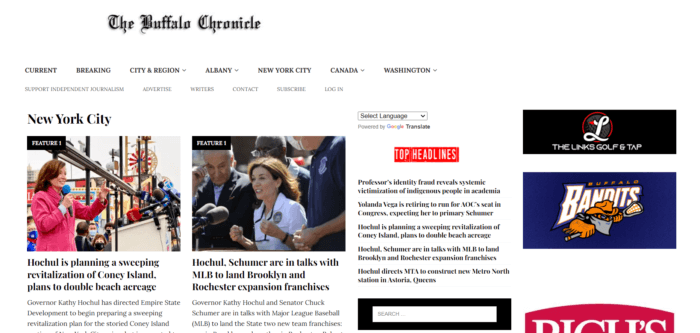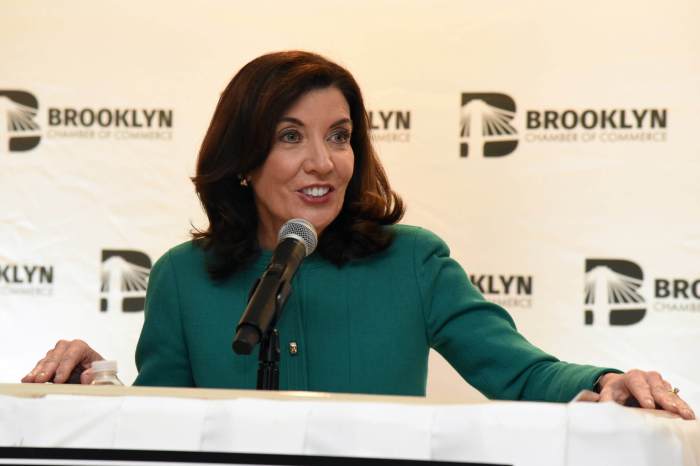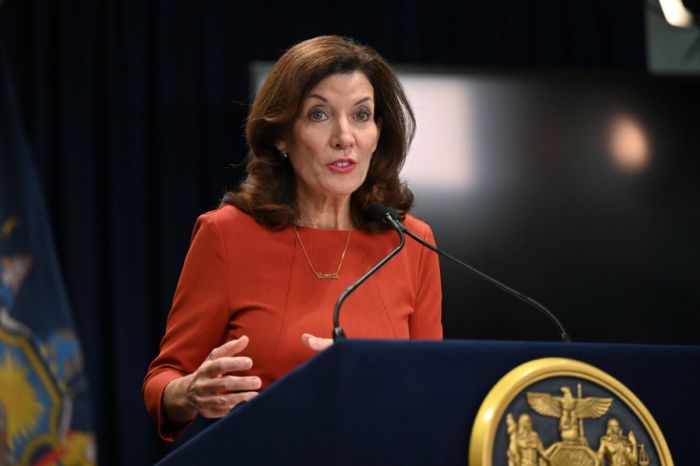A fake news website has been pumping out bogus stories about local news in Brooklyn and the rest of New York City for several years, fooling untold numbers of New Yorkers with articles that seem superficially plausible and look convincing, but lack any morsel of truth.
The Buffalo Chronicle — a fake news website which gained infamy in 2019 by publishing sham stories on the Canadian parliamentary elections — has in recent months targeted local news consumers in the Big Apple, putting out a stream of fake stories about supposed happenings at the hyperlocal level.
Convincingly Plausible
The phony-news site’s secret sauce, seemingly, is the website’s legitimate-looking presentation, along with plausible quotes falsely attributed to high-powered officials or unnamed advisors, and non-flashy headlines about topics important to local consumers.
Many “stories” concern supposed initiatives by Gov. Kathy Hochul, a Buffalo-native, to advance economic development in Kings County.
Just this past week, the Chronicle published an article claiming Hochul was planning to double the acreage of Coney Island’s beach, build a new amusement pier, and fill Coney Island Creek to create a new park — all part of a massive revitalization plan for the waterfront nabe. All of those plans are made up, but they’re presented in a convincing way, with a sober headline, fake quotes from Hochul and unnamed aides, an image of Hochul conducting a press conference at Deno’s Wonder Wheel Park, and even a professional-looking rendering of the governor’s supposed plans for the area.

The article’s paucity of truth didn’t stop it from making the rounds on social media — as it was viewed thousands of times, with hundreds of likes, comments, and shares on the Chronicle’s Facebook page, along with neighborhood Facebook where excited locals shared the “news” with others.
“I think it’s a serious issue,” said Michael Quinn, owner of Feltman’s hot dogs and a Coney Island native who co-admins the Everything That’s Coney Island Facebook group. “It has nothing to do with right to speech or whatever. It’s basically fraud.”
After the article was posted in the Facebook group, Quinn alerted other moderators and had the post taken down. Later, he wrote a Substack post entitled “Somebody Please Stop the Buffalo Chronicle,” alerting web denizens to the Chronicle’s bogus nature and calling for laws cracking down on it and similar outlets. While he shared the essay widely, it didn’t have anywhere near the reach of the Chronicle’s original article.
Although the Chronicle has been banned from Twitter, it continues to operate a Facebook page with over 3,000 followers. Over the past several months it’s put out a number of specious articles on supposedly-major urban initiatives which, as it turns out, were not reported anywhere else, because they’re fake.
A spokesperson for Meta, Facebook’s parent company, did not respond to a request for comment.
False Hope
Readers of the Chronicle would be undoubtedly fascinated by the news they consume, including that Hochul is in advanced negotiations with Major League Baseball to bring an expansion team to Brooklyn at a brand new stadium in Coney Island, wants to repurpose Green-Wood Cemetery as a public park with the help of Cardinal Timothy Dolan, intends to revive Amazon’s HQ2 proposal at the Brooklyn Army Terminal, plans to tear down the Belt Parkway, and build a public park along the Bay Ridge waterfront.
A spokesperson for the governor declined to comment on the Chronicle’s fake news proliferation, except to say that all of the stories are bogus.
“All of those things are not happening,” said Hochul spokesperson Avi Small.
In the other boroughs, the Chronicle says the UN headquarters is being moved to Governors Island, that New York Lottery hypewoman Yolanda Vega is retiring (which she is actually doing in real-life) to run for Congress against Alexandria Ocasio-Cortez (which she is not), that the MTA is building Metro-North stations in Astoria, that Hochul wants to separate Staten Island into its own city, and that former Gov. Andrew Cuomo plans to run for Tom Suozzi’s seat in Congress. Likewise, all of those stories are simply baloney.
One article from last month, which claimed that Hochul planned to relocate Madison Square Garden to a new location atop a Hell’s Kitchen park, was seen and interacted with online so widely it drew not only an article in Patch to debunk it, but a statement from the governor’s office that the article’s premise was “completely false,” with “no truth to it whatsoever.”
To Quinn, the fake news articles go beyond just misleading people: they give people false hope of attention and investment being driven towards their community, echoing a societal trend of fake news influencing public opinion, especially during the Trump era and COVID-19 pandemic.
“I’m just concerned because a lot of people in that area have been waiting a long time for some kind of investment in the community,” Quinn said. “Not in real estate, not in building amusement parks and high-rises. And this kind of indicates, oh, the governor wants to invest in Coney Island? Build better resources? If you put this kind of stuff out there, it damages those people also, they think that it’s true.”
“I don’t know what this guy’s objective is,” he continued.
Why does he do it?
That guy is Matt Ricchiazzi, a Buffalonian and self-described urban planning aficionado who has mounted several failed attempts for public office in the Western New York City, and has cultivated a reputation as a political dirty trickster. Most articles run without a byline, and readers get a 404 error when they click on the “writers” and “contact” sections of the website.
Ricchiazzi did not respond to multiple requests for comment prior to publication of this article, but following publication, he sent a Facebook message to Brooklyn Paper outlining his reasoning for publishing fake news, arguing that it’s “social art, designed to inspire the collective aspirations of the body politic.”
“The Buffalo Chronicle is not fake news,” Ricchiazzi said. “More than 98 percent of everything we publish is factual. On regular occasion we do publish satire, and on other occasions we publish content that I would describe as social art, designed to inspire the collective aspirations of the body politic.”
Specifically, he wants his “social art” to inspire the likes of the governor to undertake bold infrastructure and economic development initiatives.
“Kathy Hochul is a nice person, and my content is in no way designed to make her look bad,” Ricchiazzi said. “I want to encourage her to go further and be more bold in her infrastructure projects. The content that I produce is designed, through social art…to convince her do bold things, while educating the public about issues of urban planning and urban design.”
Despite that, Ricchiazzi does not label his content as social art, satire, or anything else that would tip off a reader to its fictitious nature. Though he doesn’t like nor embrace the term “fake news,” he doesn’t quite disown it either: he argues that by publishing phony content, not disclosed as what it is, about large-scale infrastructure development, he puts the reader in a “posture of defense” that ultimately leads them to demand more of politicians.
“There is a certain magic in the medium — of fake news, for lack of a better term — because the reader begins consuming it from a posture of defense, defending themselves against what they presume to be the inevitability of big-government inertia,” Ricchiazzi said. “[A]nd then when they are presented with a possibility that is not only plausible but would also wildly benefit their interests, they are shocked.”
“The art is in the ensuing public discourse,” he continued. “It’s putting people each in a corner and seeing how they react.”
Ricchiazzi told BuzzFeed and the Toronto Star in 2019 that his website would “never knowingly publish a falsehood” and expressed “confidence in all of our reporting to date,” but an investigation by those outlets found that he had written slanted coverage in favor of political candidates that had paid him “consulting fees” — and, on at least one occasion, he had explicitly solicited bribes from a candidate for slanted coverage.
“Fees are as follows: positive articles about your candidacy are $200; negative articles about your opponents are $400; and an editorial endorsement is $300,” Ricchiazzi told a candidate in an email obtained by BuzzFeed and the Toronto Star.
‘An Entirely Proper Exchange’
Speaking with Brooklyn Paper, Ricchiazzi steadfastly denied having ever solicited a bribe or any other “illicit exchange.” On the contrary, he claimed that he had engaged in perfectly-on-the-level “content sponsorship” from political entities, which he characterized as the “nature and basic structure of the publishing industry in North America.”
“I’m not a reporter. I’m a publisher,” Ricchiazzi said. “There is no ethical issue with regard to taking money for favorable coverage. That’s the nature and basic structure of the publishing industry in North America.”
“It’s not at all an illicit exchange,” he continued. “It’s an entirely proper exchange, of a political sponsoring content, or someone placing an advertisement in a publication because they are funding publicity. That’s how local newspapers work. That’s what keeps local publications in small towns alive.”
It is true that political advertisements are a staple of the newspaper industry; many publications, including Brooklyn Paper, do indeed run them, but federal law requires that the entity that paid for the ad is disclosed in its body in a “clear and conspicuous” way. The Buffalo Chronicle has, on several occasions, not done this, instead taking money from political candidates and filing stories favorable to that candidate, with no disclosure of the payments.
For instance, state campaign finance records show that the Chronicle has accepted $2,000 in “consulting fees” from a PAC associated with Joel Giambra, a former Erie Countie executive who sought the Republican and later Reform Party nomination for Governor in 2018. Throughout 2018, the Chronicle published several articles supportive of Giambra, including one calling him a “proud moderate” “with a bold plan.” None of those articles disclose the fact that the Chronicle had received money from Giambra, nor that they were even sponsored content at all. The articles are not even referred to as op-eds.
While the political ads are not disclosed, the Chronicle does boast a number of ads on its sidebar for Buffalo-area businesses and institutions, from the University of Buffalo Bulls and the Buffalo History Museum, to Charlie the Butcher and Smokin Joe’s Cigar Shop.
Ricchiazzi said that some advertisers are billed for spots on the website but that most are provided free ad space “because I like to support locally owned businesses in the Buffalo and Western New York community.”
But at least some of those advertisers say that they are not only not paying for the ads, but that they had no idea the ad was being displayed on the Chronicle site.
The owners of Colter Bay, a brewpub in Downtown Buffalo, said that they are not paying for ads on the site and said they’ll be seeking to have them removed.
“It seems they have a pretty clear political agenda, or at least it spreads somewhat biased misinformation,” said Calder Wright, the manager at Colter Bay, in a phone interview. “Based on what we saw, it’s definitely not in keeping with our values as a business, and we’re definitely gonna take action to make sure we’re removed from any affiliation with that website.”
A spokesperson for Wegman’s, the upstate-based grocery chain with a location at the Brooklyn Navy Yard, confirmed that the chain had not purchased any ads with the Chronicle.
A representative for Smokin’ Joe’s said that the company does not buy ads with the Chronicle, though when Brooklyn Paper asked to speak with Smokin’ Joe himself, the rep hung up the phone.
Update (Feb. 1): This article has been updated with comment from Matt Ricchiazzi, the publisher of the Buffalo Chronicle.























